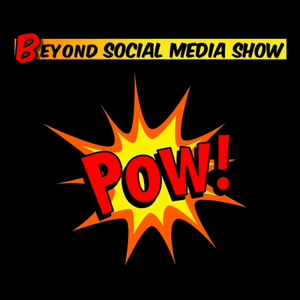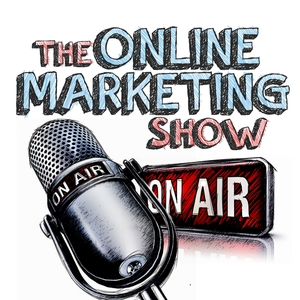
VISA CCO, Paul Cohen, on Experiential Communications and the Importance of Overcommunicating to Employees During Covid
01/26/21 • 33 min
“If calendar year 2020 didn't change the role of comms or enhance the role of comms within your organization, you may be in the wrong organization or the wrong job.”
Paul Cohen joined Visa as Senior Vice President and Chief Communications Officer in 2017, coming from a similar role at PayPal. At PayPal, he spent two years setting up the company’s first corporate communications function and overseeing communications about its separation from eBay. Before that, he’d been with Visa for more than a decade, serving in his last position as Senior Vice President of Corporate Communications and Marketing for North America.
His time at Visa has been marked by, among other notable accomplishments, overseeing the company’s record-setting initial public offering. Before Visa, he was in-house at AT&T and also spent time with Fleishman-Hillard and The PBN Company agencies. Paul has been identified by PRovoke as one of the globe’s 100 most influential in-house communicators multiple times, most recently in 2020.
Here are some key takeaways from this interview.
When communicating with employees around major shifts like the overnight switch to working from home, transparency is the key. Over-communicate and make sure employees feel cared for and safe. And come at it from a variety of angles. Visa not only connected employees virtually with doctors who could explain health issues but also with psychologists who could provide expert insight into coping with the changes. The company also connected employees with each other through an intranet that facilitated activities from swapping recipes to exchanging homeschooling tips.
Traditional advertising that disrupts consumer experiences is being replaced by experiential communications. We all know consumers won’t tolerate long commercial breaks in the middle of a television program. So what marketers do instead is embed messages in ways that feel more natural. Communications can help here, with more engagement on social media and through events. Visa, for instance, is a sponsor of the Olympics, FIFA, and the NFL. The expanded importance of experiential communications is here to stay while traditional advertising’s days are very much numbered.
Measurement is critical when interacting with business leaders, but so far, AI isn’t making much impact. At Visa, a longstanding challenge has been to transition the brand's image from that of a credit company to that of a payment technology company. Reputation is also a focus. In both areas, measurement of communications impact is vital. Visa is increasingly investing in more reputation measurement-type tools, including pulse polling done periodically as well as spot polls on current issues to guide decisions about whether to engage or not. AI and predictive tools, however, haven’t proven themselves at this brand.
-----
Produced by Simpler Media
“If calendar year 2020 didn't change the role of comms or enhance the role of comms within your organization, you may be in the wrong organization or the wrong job.”
Paul Cohen joined Visa as Senior Vice President and Chief Communications Officer in 2017, coming from a similar role at PayPal. At PayPal, he spent two years setting up the company’s first corporate communications function and overseeing communications about its separation from eBay. Before that, he’d been with Visa for more than a decade, serving in his last position as Senior Vice President of Corporate Communications and Marketing for North America.
His time at Visa has been marked by, among other notable accomplishments, overseeing the company’s record-setting initial public offering. Before Visa, he was in-house at AT&T and also spent time with Fleishman-Hillard and The PBN Company agencies. Paul has been identified by PRovoke as one of the globe’s 100 most influential in-house communicators multiple times, most recently in 2020.
Here are some key takeaways from this interview.
When communicating with employees around major shifts like the overnight switch to working from home, transparency is the key. Over-communicate and make sure employees feel cared for and safe. And come at it from a variety of angles. Visa not only connected employees virtually with doctors who could explain health issues but also with psychologists who could provide expert insight into coping with the changes. The company also connected employees with each other through an intranet that facilitated activities from swapping recipes to exchanging homeschooling tips.
Traditional advertising that disrupts consumer experiences is being replaced by experiential communications. We all know consumers won’t tolerate long commercial breaks in the middle of a television program. So what marketers do instead is embed messages in ways that feel more natural. Communications can help here, with more engagement on social media and through events. Visa, for instance, is a sponsor of the Olympics, FIFA, and the NFL. The expanded importance of experiential communications is here to stay while traditional advertising’s days are very much numbered.
Measurement is critical when interacting with business leaders, but so far, AI isn’t making much impact. At Visa, a longstanding challenge has been to transition the brand's image from that of a credit company to that of a payment technology company. Reputation is also a focus. In both areas, measurement of communications impact is vital. Visa is increasingly investing in more reputation measurement-type tools, including pulse polling done periodically as well as spot polls on current issues to guide decisions about whether to engage or not. AI and predictive tools, however, haven’t proven themselves at this brand.
-----
Produced by Simpler Media
Previous Episode

BENTLEY MOTORS CCO & CMO, Jeffrey Kuhlman, on DEI and Holding Safe Events During COVID
Jeffrey Kuhlman is Chief Communications and Marketing Officer at Bentley Motors, Inc. Jeff was serving as communications chief for the U.S. arm of the British luxury automobile brand when he added marketing responsibilities in 2016. He reports to the president of Bentley USA as well as the U.K.-based global communications director.
Jeff is an auto industry comms veteran, having worked for several automobile brands during his career. In addition to Bentley, which he joined in 2015, he’s filled communications shoes at Nissan, Audi, and General Motors. GM was his longest stint, extending 22 years until 2006 when he began a five-year engagement as chief communications officer at Audi. He handled jobs from speechwriter to environmental communications for Cadillac, GM Truck, and other divisions.
Here are some key takeaways from this interview.
You can still have events safely during a pandemic if you follow health guidelines. As a brand that emphasized in-person events as a key marketing channel, Bentley needed to find a way to keep bringing customers and prospects together with its cars and people face-to-face. They found it in the form of limited-contact get-togethers with small numbers of people where effective social distancing was observed along with effective exposure to the brand and the vehicles.
If you’re looking for a mentor, don’t look far. The best mentor is probably someone you’re already working with or for. This person will be familiar with your work and be senior enough to give you some insight into what you’ll face as you ascend the ladder; and, ideally, a push from behind if you need it. Start by just hanging around and asking questions. If the connection is there, then and only then inquire about the prospects for being mentored.
Addressing diversity, equity, and inclusion starts as an inside job. If your brand isn’t working to be more fair and just with its own employees, it won’t be perceived as credible by those outside the company. For Jeff, this starts with discussing what diversity and inclusion mean to your team members and identifying the current challenges and opportunities there.
To craft the professional future you want, stay curious and close to your passion. Jeff’s career with General Motors took off when he was challenged to master advanced automotive technology. That showed him the value of learning and staying interested and curious. Later, when he returned to the U.S. from Japan, he was motivated in part by a passion for returning to a more boots-on-the-ground mode of working than he was getting as global head of communications for Nissan.
If your brand is celebrating a major anniversary, focus as much or more on the future as the past. For Bentley’s “Beyond 100” initiative, marking a century of existence, the brand naturally looked back at its legendary designs but also emphasized what it was doing to attract tomorrow’s buyers. One result was the determination to go all-electric by 2030.
Thank you for listening! Don't forget to subscribe.
-----
Produced by Simpler Media
Next Episode

Best Buy CCO, Matt Furman on Storytelling Over Data & Championing Truth in the DEI Discussion
“If you speak to 100 people, a third of them didn't listen, a third of them forgot what you said, and the other third didn't believe you. And so you’ve got to speak, and you’ve got to speak again, and you’ve got to speak again.”
Matt Furman serves as the Chief Communications and Public Affairs Officer at Best Buy, where he’s been since 2012. He’s responsible for communications--internal and external--as well as government affairs, CSR, and community relations. In addition, Matt manages event planning and Best Buy’s in-house production studio.
Before joining the Minneapolis retailer, Matt held the Vice President of Corporate Affairs job at Mars Chocolate. Earlier gigs included communications leadership positions at Google and CNN. He worked in the administrations of Bill Clinton and Rudy Giuliani as well. A graduate of the American University School of Law, Matt is a licensed attorney and has been a member of the journalism and mass communication adjunct faculty at the University of Minnesota.
Here are some key takeaways from this interview.
Consistency is the key to communications. Matt very elegantly stated, ‘if you speak to 100 people, a third of them didn't listen, a third of them forgot what you said, and the other third didn't believe you. And so you’ve got to speak, and you’ve got to speak again, and you’ve got to speak again.” The statement speaks for itself and is a true testament to how the job of a communicator is never truly done, and comms workers must take note of that. Repetition is the key to scaling the efficacy of any communications campaign.
Not everybody is convinced data and analytics have a central role to play. Matt has resisted the prevailing industry view that communications can be understood scientifically, the way marketing can, which is why he employs data in a limited fashion at Best Buy. The main reason, he says, is the difficulty of measuring sentiment in a communications context. For him, when a good story is told well,l it will be recognized. Similarly, when a crisis is handled well–or poorly—people will know it, and they don’t need data to convince them.
With matters of DEI, put everything on the table. The road to better DEI standards and practices can be daunting, but the best, and arguably, the only place to start is with your own company’s truth. Stating up front where you know you need to do better not only inspires trust and faith in your employees & customers but allows you not to be paralyzed by the fear of your own company’s shortcomings since you owned up to them upfront. It may be uncomfortable, but any discussions that lead to lasting change have to start with the truth, regardless of how hard it may be.
-----
Produced by Simpler Media
If you like this episode you’ll love
Episode Comments
Generate a badge
Get a badge for your website that links back to this episode
<a href="https://goodpods.com/podcasts/frictionless-marketing-497329/visa-cco-paul-cohen-on-experiential-communications-and-the-importance-65804555"> <img src="https://storage.googleapis.com/goodpods-images-bucket/badges/generic-badge-1.svg" alt="listen to visa cco, paul cohen, on experiential communications and the importance of overcommunicating to employees during covid on goodpods" style="width: 225px" /> </a>
Copy




